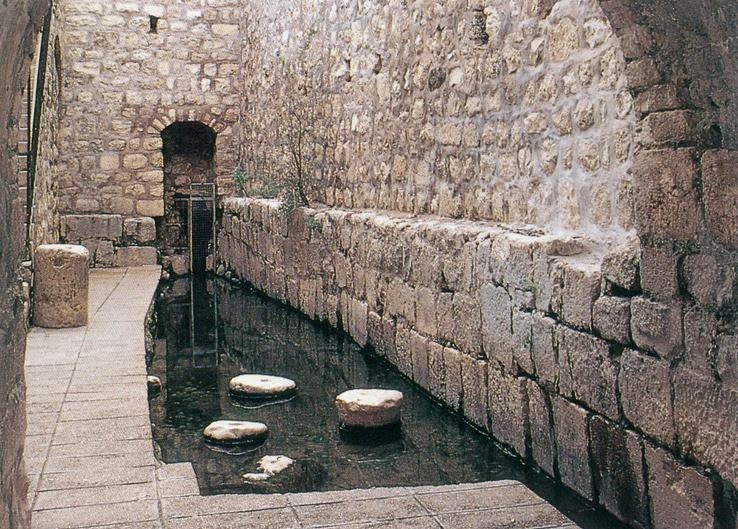RCL Reflection, Fourth Sunday in Lent, Year A
Lessons: 1 Samuel 16:1-13, Psalm 23, Ephesians 5:8-14, John 9:1-41
Theme: God’s faithful and generous people can be blinded to God’s abundant possibilities and plans; however, Jesus desires to heal us and restore our vision for mission, ministry, and stewardship.
Key Scripture: He answered, “The man called Jesus made mud, spread it on my eyes, and said to me, ‘Go to Siloam and wash.’ Then I went and washed and received my sight.” John 9:11
Preaching/Teaching Reflection
Could it really be that simple? Jesus gives sight to a man blind from birth using only a little spit, some ordinary dirt, and a few words? It seems so improbable. In fact, the religious leaders, the disciples, and the man’s parents have real problems with the whole scenario. But not the man, who can now see clearly. He believes and worships Jesus. It seems to me that everybody but Jesus and the unnamed-but-now-sighted man  misses the forest for the trees, so to speak, about this miracle.
misses the forest for the trees, so to speak, about this miracle.
It starts with a question of sin. Whose fault is it, ask the disciples, that this poor man is blind? There has to be someone to blame. Of course they’re asking the wrong question. It’s not about fault at all, but about God’s divine love, mercy, and grace. It’s about how Jesus is able to take our messes, our hurts, and our deficiencies, and using the most improbable methods he can make us whole and fit us for the work of discipleship and worship.
The religious leaders and authorities don’t believe that such a miracle could have occurred. Who heals a certifiable blind beggar using spit, dirt, and a few words? Why, that’s plain crazy and completely out of order. Only the God of Abraham is equipped to heal–not some renegade rabbi claiming to be God’s son. Even the man’s parents refuse to take a clear stand for fear they’ll be put out of the synagogue.
Today, 2000 years later, Jesus is still in the business of miracles. He takes us, ordinary sinful, yet named-and-claimed disciples, and through water, word, bread, and wine equips us to be his people. He takes our humble gifts and multiples our meager offerings in ways that can’t be explained rationally.
Think about it. How can a small congregation band together to raise thousands of dollars to fight malaria or feed the hungry? How can a few committed Christians stand in the breach to bring about real change and hope to their sisters and brothers in despair? How can a few folks rally around a family facing a life-threatening illness and blanket them with love, prayers, meals, help, and comfort for each step of the journey? How does one chaplain help hundreds of prisoners experience God’s love, and how do a few students feed a huge  homeless population through meager means and limited resources? Such miracles of hopeful grace happen every day when Jesus opens our eyes, blinded by fear, to get a glimpse of his glory.
homeless population through meager means and limited resources? Such miracles of hopeful grace happen every day when Jesus opens our eyes, blinded by fear, to get a glimpse of his glory.
Not sure it can work in your context? Are you wondering whether you have the wherewithal to steward your meager assets and abilities and cast a bold new vision? Do you fear nothing can open the eyes of your sisters and brothers to see the real presence of Christ in your midst? Why not step out in “blind faith” and give it a try? If Jesus can give sight to the sightless using only a little spit and mud, imagine the miracle he can work with your humble gifts. Don’t wait until you’re ready or have a successful stewardship drive. Wash the mud and spit from your eyes and experience the miracle of real vision.
In Worship
Why not sing a setting of the beloved Psalm 23 today? If you want something different from a chanted version, consider a setting of “The King of Love my Shepherd Is.” Click here for a lovely version posted on YouTube.
With Youth
God Sees the Heart
How do you choose a leader? It often seems that the most popular people are chosen to lead, or the best looking, or the ones with the most money, the right set of friends, or even the coolest car. Did you ever see the movie Napoleon Dynamite? In that quirky tale, Pedro is lifted up as a candidate for class president by the unlikely and totally geeky Napoleon–and he wins. One beautiful point the movie makes is that what we see on the surface doesn’t tell the whole story of a person’s substance and worth. In the story of David’s anointing as the future king of Israel (1 Samuel 16:1-13), God tells Samuel not to look on appearance or height because God does not see as mortals see. God looks on the heart.
How can we look on the heart of those we see and not be distracted or make assumptions based on appearances? Why should we be glad that when God looks on our hearts, the imprint of Jesus is already there?
With Children
You are Light
Would you rather be in the dark or in the light? Most children prefer to be where it’s light, and after a long winter we all prefer a bright, sunny day. In the epistle lesson from Ephesians, Paul says “For once you were darkness, but now in the Lord you are light” (Eph. 5:8). So we were dark, but now we’re light. How does that happen? How can this be? And how do we live as children of the light? It will help to have either a small solar-powered light (fully charged) or a flashlight. Remind children that we are not light without Jesus. Show them the light source. Ask them if they know how it works? What happens when there is nothing to give a charge to the light–no sunlight or batteries? The light source goes dark. So, too, without Jesus we grow dark. We need to be connected to our light source so that we can charge our spiritual batteries or solar cells and live as light. We also need to shine our Christ light into the dark places of this world so that all may see and know his love. Finish with a simple prayer.
Weekly Stewardship Bulletin Insert
Do you really believe that with God all things are possible? It is often easier to speak this truth rather than live into it. If Jesus can use spit, mud, and words to restore a man’s sight, why do we doubt he can take what we have—no matter how meager or limited—and make something new and wonderful of it? Let’s be faithful stewards of God’s amazing grace and trust that the Creator of the Cosmos cares for us and desires good things for the community that gathers here.
Stewardship at Home
Where are our “blind spots” in our daily discipleship? Whom do we fail to see? Why do we fail to trust God’s grace and mercy for us and for others? How can we ignore the signs of divine abundance and choose an image of scarcity instead? This week make an effort to see God at work all around you. Open your eyes! Be healed and have your “vision” restored.
Photos: mOOby and Brandon Atkinson, Creative Commons. Thanks!
Note: Reprint rights granted to congregations and other church organizations for local, nonprofit use. Just include this note: “Copyright (c) 2017, Rev. Sharron Blezard. Used by Permission.” Other uses, please inquire: thewritelife@hotmail.com.




Leave a Reply